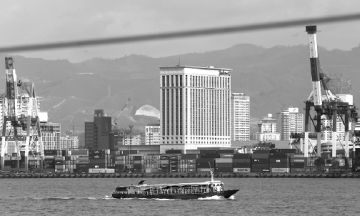
Logistics firms help deliver cargoes to destinations around the world.
CDN FILE PHOTO
Logistics stakeholders tapped to help create better policies for sector
The Department of Trade and Industry (DTI) is seeking the cooperation of logistics stakeholders to help formulate better policies for the sector.
Ma. Elena Arbon, DTI Cebu provincial director, said they are inviting logistics services providers, manufacturers, and those who avail of logistics services to attend a Focus Group Discussion (FGD) on Logistics Efficiency Indicators (LEI) this Thursday.
“The LEI is a data-gathering activity designed to development measurement and baseline assessment of Philippine logistical costs, time efficiency, and reliability in transporting goods or cargoes and services, which are critical for the logistics and supply chain management sector’s policy formation,” she said in a statement.
The FGD will be held on April 20 from 9:30 a.m. to 2:30 p.m. at the Golden Prince Hotel and Suites in Cebu City.
Discussions
Leading the discussions is the Competitiveness Bureau’s Supply Chain and Logistics Management Division (CB-SCLMD), an advisory body under the DTI, in partnership with the World Bank.
“The said study will determine how efficient the players are when compared to other Asean countries in terms of international and domestic requirements,” said Arbon.
A business-matching activity and consultation will follow after the FGD.
The World Bank’s International Logistics Performance Index (LPI) placed the Philippines at the 71st spot in 2016, with a score of 2.86.
Benchmarking tool
According to the World Bank’s website, the LPI is an “interactive benchmarking tool created to help countries identify the challenges and opportunities they face in their performance on trade logistics and what they can do to improve their performance.”
Countries are evaluated by their trading partners in six areas including customs, infrastructure, international shipments, logistics competence, tracking and tracing, and timeliness.
Germany (4.23), Luxembourg (4.22), Sweden (4.20), the Netherlands (4.19), and Singapore (4.14) made up the LPI’s top five in 2016.
4 challenges
In an earlier report, CB-SCLMD assistant chief Jonathan Cabaltera said the country’s logistics sector currently faces four challenges including policies, regulation, institution, and infrastructure.
Of the four, he said infrastructure is the main challenge since the government has been underspending even while the Philippine economy has been enjoying gains quarter after quarter.
The Philippines enjoyed a growth rate of 6.8 percent in 2016, but infrastructure still needs to catch up.
This is evident in the congestion of roads, seaports, and airports, which contributes to a hike in prices, such that in the Philippines, logistical costs account for 24 to 53 percent of wholesale prices; shipping and port handling costs account for 8 to 30 percent, depending on the goods and route; and five percent of the retail price of goods.
Master plan
The DTI has yet to release the final version of the National Logistics Master Plan until 2022, which aims to advance the competitiveness of the Philippines through a more efficient logistics sector that contributes to a robust and resilient economy.
More than the movement of goods and services from one point to another, logistics is defined as a part of the supply chain that covers information flow, material handling, production, inventory, transportation, warehousing, border regulatory procedures, and security.

